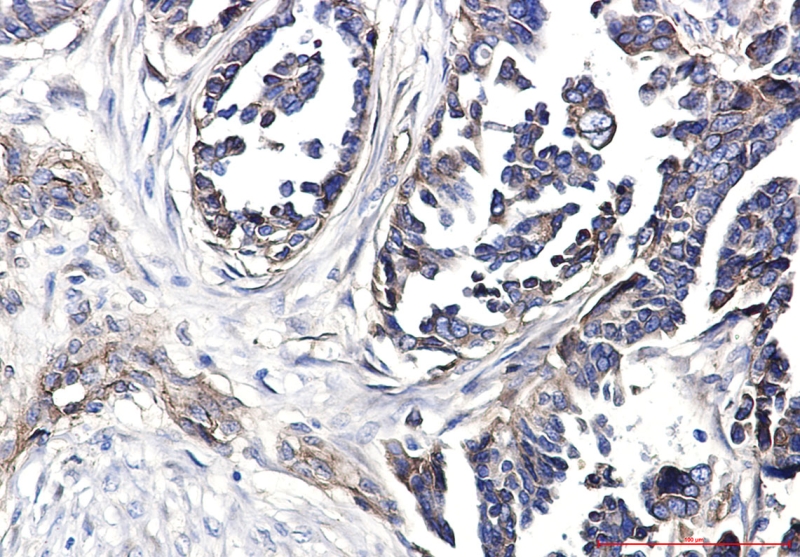
| WB | 咨询技术 | Human,Mouse,Rat |
| IF | 咨询技术 | Human,Mouse,Rat |
| IHC | 1/50-1/100 | Human,Mouse,Rat |
| ICC | 技术咨询 | Human,Mouse,Rat |
| FCM | 1/50-1/100 | Human,Mouse,Rat |
| Elisa | 咨询技术 | Human,Mouse,Rat |
| Aliases | ITGB1; FNRB; MDF2; MSK12; Integrin beta-1; Fibronectin receptor subunit beta; VLA-4 subunit beta; CD antigen CD29 |
| Entrez GeneID | 3688 |
| WB Predicted band size | Calculated MW: 88 kDa; Observed MW: 120-160 kDa |
| Host/Isotype | Rabbit IgG |
| Antibody Type | Primary antibody |
| Storage | Store at 4°C short term. Aliquot and store at -20°C long term. Avoid freeze/thaw cycles. |
| Species Reactivity | Human |
| Immunogen | A synthetic peptide of human Integrin beta 1 |
| Formulation | Purified antibody in TBS with 0.05% sodium azide,0.05%BSA and 50% glycerol. |
+ +
以下是3篇与Integrin β1抗体相关的研究文献及其摘要:
1. **"Integrins: Bidirectional, Allosteric Signaling Machines"**
- **作者**: Hynes, R.O.
- **摘要**: 该综述系统总结了整合素(包括β1亚基)的结构与功能,强调其作为双向信号传导分子的作用,参与细胞黏附、迁移和生存调控,为靶向β1抗体的研究提供理论基础。
2. **"Blockade of β1 integrin induces amlodipide-mediated suppression of NSCLC progression"**
- **作者**: Yamamoto, H. et al.
- **摘要**: 研究通过β1抗体阻断实验,揭示了β1整合素在非小细胞肺癌(NSCLC)侵袭和转移中的关键作用,并证明其与钙通道阻断剂的协同抗肿瘤效应。
3. **"Integrin β1 regulates stem cell metabolism and niche adhesion in the intestinal epithelium"**
- **作者**: Jones, R.G. et al.
- **摘要**: 利用β1抗体抑制实验,发现β1整合素通过调控LGR5+肠道干细胞的代谢重编程和生态位锚定,影响组织再生与稳态维持。
4. **"Mechanosensing through β1 integrin induces chemoresistance in breast cancer"**
- **作者**: Seguin, L. et al.
- **摘要**: 研究证明β1整合素通过机械信号转导激活Wnt/β-catenin通路,导致乳腺癌化疗耐药,而β1抗体可逆转此过程,提示其治疗潜力。
以上文献涵盖β1抗体在基础机制、肿瘤治疗及干细胞调控中的应用,可作为相关研究的关键参考。
Integrin beta 1 (ITGB1), also known as CD29. is a critical subunit of the integrin family of cell surface receptors that mediate cell-extracellular matrix (ECM) and cell-cell interactions. As a key component of heterodimeric integrin receptors, it pairs with various alpha subunits (e.g., α1-α11. αV) to form distinct integrins (e.g., VLA-4. VLA-5. α5β1) that regulate cell adhesion, migration, signaling, and survival. ITGB1 is ubiquitously expressed and plays essential roles in embryonic development, tissue homeostasis, immune responses, and cancer progression by transmitting bidirectional signals between the ECM and intracellular cytoskeleton.
Antibodies targeting Integrin beta 1 are widely used as research tools to study its expression, function, and signaling pathways. These antibodies enable detection of ITGB1 via techniques like flow cytometry, immunohistochemistry, and Western blot. Function-blocking anti-ITGB1 antibodies are employed to inhibit integrin-mediated adhesion or signaling in vitro and in vivo, providing insights into its role in processes like tumor metastasis, angiogenesis, and stem cell maintenance. Dysregulation of ITGB1 is linked to fibrosis, autoimmune diseases, and cancer, making it a potential therapeutic target. Both monoclonal and polyclonal antibodies have been developed, with applications spanning basic research, diagnostics, and drug development.
×